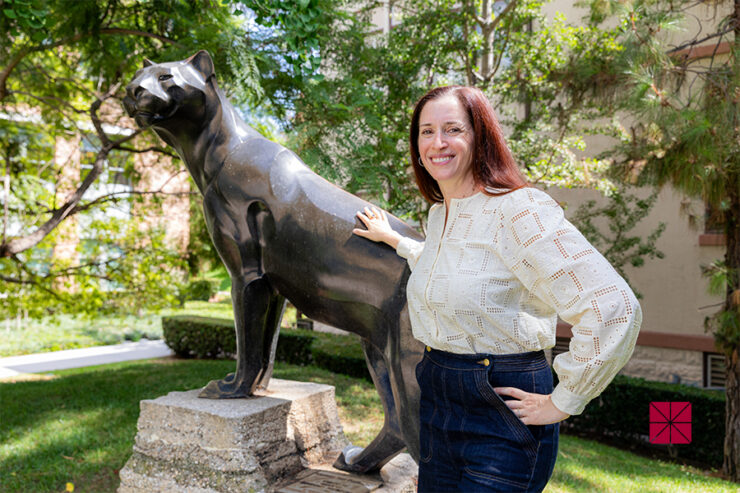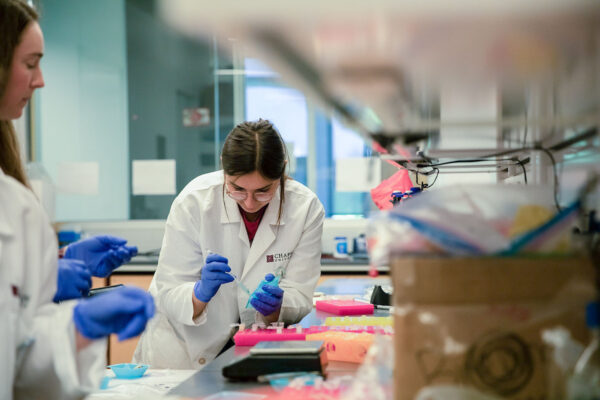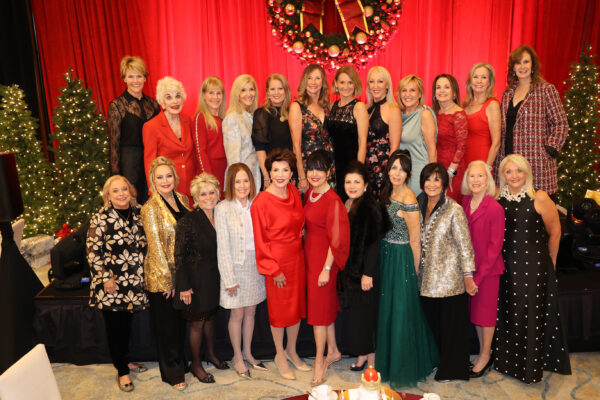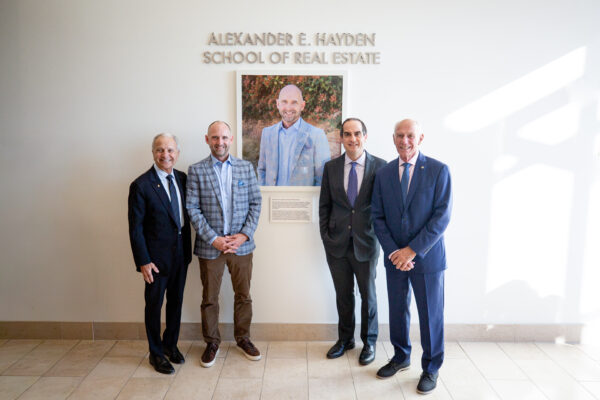It wasn’t uncommon for Professor of Communication Vikki Katz to bring current news and events into her Communication and Social Change course. After all, the class focused on how communication and technological dynamics influence the polarization of American civic life, prodding the question of whether Americans are truly as divided as we perceive.
However, on October 10, 2023, Katz knew the events of just a few days earlier would alter the course for the rest of the semester—and possibly every future semester as well.
Within hours of Hamas militants raiding Israeli communities on Oct. 7, a complex historical conflict was being reduced to headlines, hashtags and sensationalized videos. Students suddenly found themselves in a defining geopolitical moment where everything they were studying in Katz’s class was unfolding in real time.
At the start of class that day nearly two years ago, Katz told her students that they were going to learn to resist the comfort of quickly choosing a side and instead stay in the discomfort of learning to operate from a place of mutual respect and curiosity, to develop a knowledge base strong enough to hold challenging conversations with each other.
“I wanted them to understand how this world event was going to, for better or for worse, shape how Americans treated each other,” Katz said.
That moment set in motion the creation of an ambitious initiative and the transformation of civil discourse at Chapman University.
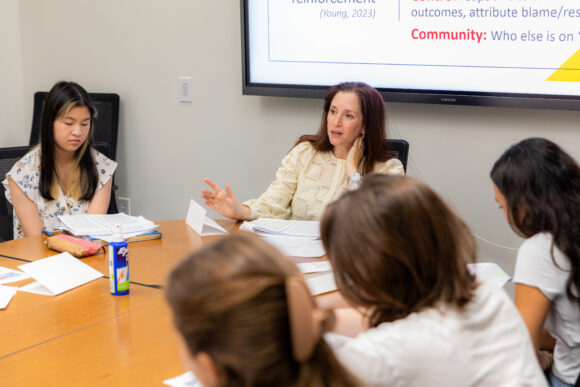
Exploring the Roots of Division
Throughout her career, Katz’s research has focused on the complex intersections of communication, technology and young people’s development. She worked for years on research that helped policymakers design better programs to make access to technology and broadband internet more equitable, to expand educational opportunities for young people.
And yet, the embeddedness of these technological tools in children’s lives carry risk as well. They are flooded with information but need to develop capabilities for how to identify high-quality information and generate meaningful knowledge, especially about complex topics. As young people engage more with their peers online, their abilities to have thoughtful and open face-to-face discussions, especially when they disagree, need more development.
“These are evergreen skills that young people are having less opportunities to develop in a world that’s increasingly digital, especially as a consequence of pandemic reliance on technology,” Katz said.
Katz attributes some of these challenges to communication dynamics within media, particularly for young people on social media. Platforms touted as ways to connect and inform often produce the opposite effect. Young people report higher rates of loneliness, anxiety and depression. In research she conducted with college students across the country after Oct. 7, Katz found that although students had access to endless streams of information they could discuss with peers, they rarely engaged in those conversations face to face.
“I was so interested in what communicative conditions made young people more likely to engage someone else in a face-to-face conversation about these topics,” Katz said. “What made them step forward rather than step back?”
On social media, the easiest way to hold attention is through outrage. As a result, extreme perspectives are amplified and rewarded. To participate, people feel compelled to pick a side—or risk becoming targets of outrage themselves. Rather than taking the time to understand the historical contexts behind complex issues, young social media users may be tempted to quickly adopt whatever perspective would garner them favor from peers that they identify with.
“These dynamics make them less likely to risk having conversations with other people in person,” Katz said, adding that in the process, they lose valuable opportunities to build deep, working knowledge of complex subjects.
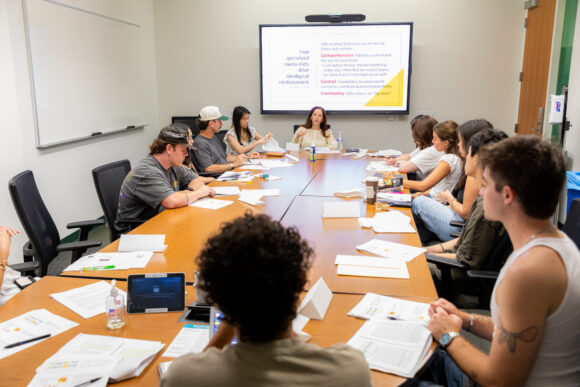
Proving Civil Discourse Can Work
To address these communication issues in young people, Katz began using the concept of the Three A’s—affirmation, affiliation and accuracy—in her classroom to measure the likelihood of engagement in difficult conversations.
To foster affirmation, she set expectations of respect from the very first day. Katz empowered students to share their perspectives and listen carefully to others. She aimed for students to feel that they brought something to the table and that it was honored by her and by their peers in an authentic way.
Katz cultivated affiliation by connecting students who shared perspectives on specific issues. Often, those same students differed on other political topics. But by identifying where they agree, they are braver about approaching disagreements with care, working towards understanding each other’s perspective rather than tirelessly arguing their point.
Most importantly, Katz ensures that her students do not begin engaging each other in discussions before developing a strong sense of accuracy, having developed a solid evidence base by engaging with a wide array of high-quality sources so that they could speak with confidence from a shared foundation of knowledge. This approach creates sustained, productive engagement with the evolving Israel-Palestine news throughout the semester, whether the class has substantial numbers of students with direct ties to the region, or most are learning about the issue for the first time.
Chapman student Luke Sonderman recalled being intimidated on his first day in Katz’s class because he wasn’t a communication major. But Katz told him the skills he would learn would be helpful for everyone—that if they could develop skills for civil discourse around the Middle East conflict, those skills would transfer easily to other contentious and complex topics.
As the course progressed, Sonderman was surprised to discover how much he belonged. He and his classmates greeted each other by name. They moved through discomfort to find common ground, and they debated and disagreed without being disrespectful of each other.
“The big thing that changed for me was shifting away from the idea that you have to choose a side on an issue,” Sonderman said. “We were all able to hold two truths at once and see how we were more alike than we thought.”
Noel McGuire ’20 (M.S. ’21, Ph.D. ’24), one of Katz’s doctoral students, didn’t participate directly in the course but collaborated with Katz on research into the effect of Oct. 7, antisemitism and Islamophobia on college students. McGuire saw how Katz employed nuance and understanding in every aspect of her work.
“Dr. Katz opened my eyes to what it means to see and understand how people’s cultures, environments and lived experiences impact the way that they see the world around them,” McGuire said.
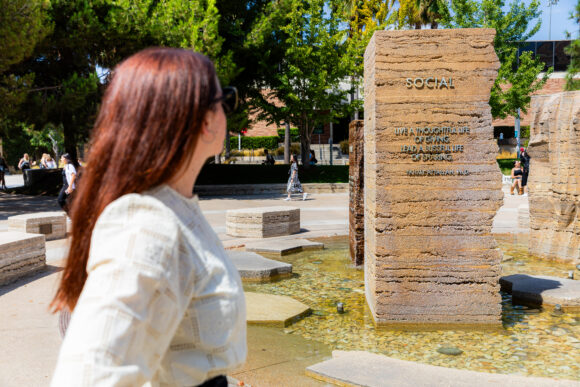
Funding a Future for Civil Discourse
The success and outcomes of Katz’s courses showed that semester-long classes—rather than short-lived events—offered the best environment for deep learning. Classrooms can be community spaces where students can slow down, wrestle with evidence, and move beyond their feelings on an issue to learning how to build arguments and engage each other with curiosity and generosity to explore their points of disagreement.
The Samueli Foundation took notice, announcing earlier this year that it will provide a generous $1.85 million gift to fund the launch of the Or Initiative under Katz’s leadership. The gift provides five years of support to scale her approach to civil discourse for middle and high school students. The initiative will equip young people with tools to navigate contentious issues—especially the Israeli-Palestinian conflict and related U.S. antisemitism—through evidence-based, innovative approaches. Its programs for middle and high school students will focus on building strong digital research skills and fostering civil discourse rooted in empathy and respect.
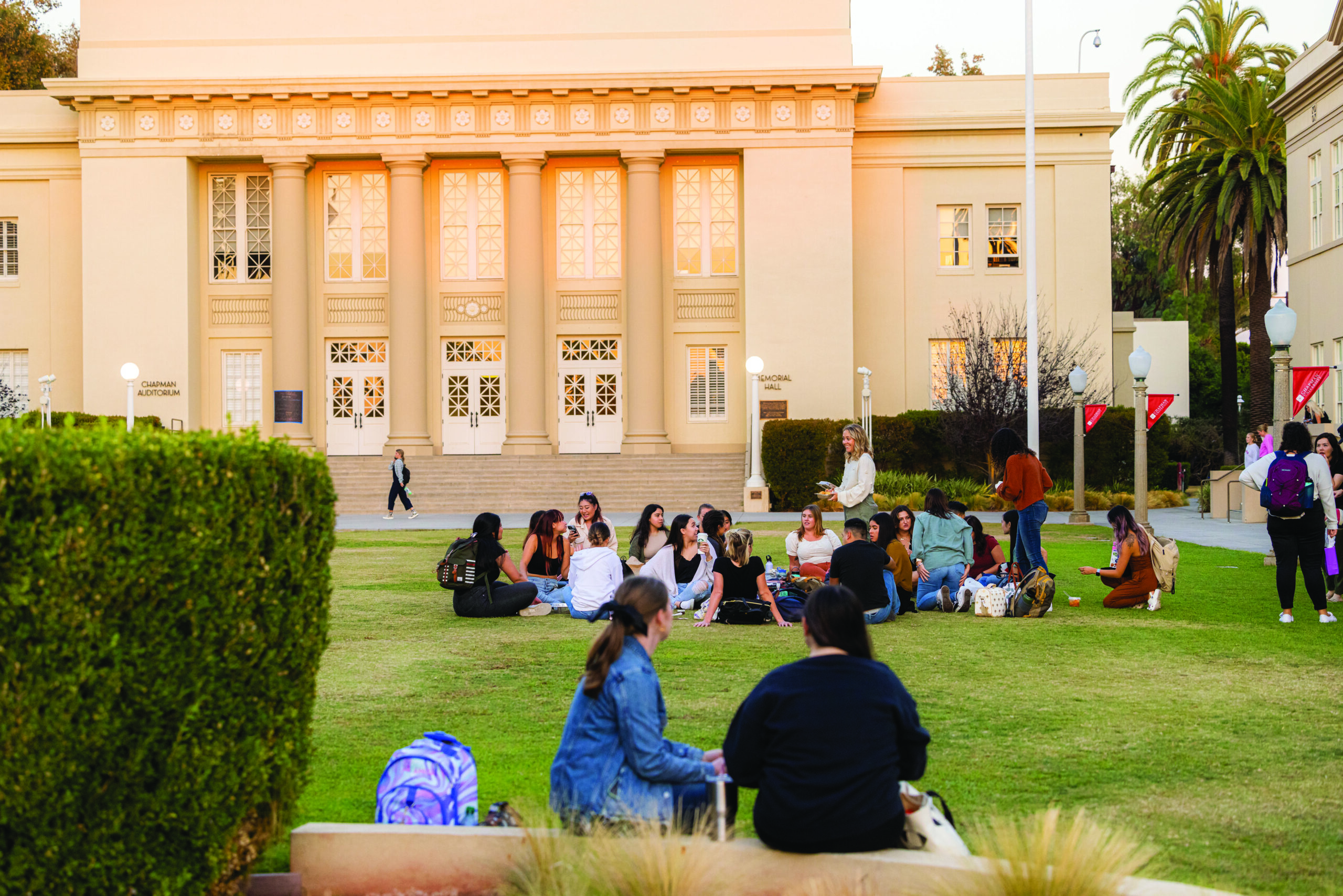
DJ Shelton, curriculum specialist for the Or Initiative and a former high school teacher, reflected on the unique role of technology and social media in students’ lives.
“It’s not that students don’t care. It’s not that they don’t want to care. It’s not that they’re completely uninformed,” he said. “It’s usually that they are very empathetic, lightly informed, but scared to be judged. And the scared component is the inhibitor here.”
To overcome fear of outrage and exclusion, Katz is developing curriculum that helps students get comfortable with discomfort, embrace failure as a means to growth and cultivate respect for differences.
Educators are essential to this work. To prepare teachers of all backgrounds, the Or Initiative will develop and refine tools, resources, and support systems so educators can feel safe and confident in guiding respectful and complex discussions.
“I remember with my students, I saw how much they relied on technology,” said Rachel Sato, assistant director of the Or Initiative and a former middle school teacher. “Yet the moment that I dismissed this reliance, it never worked in my favor. Our goal is to help educators have the tools to help students balance technology with their offline worlds.”
A unique element of the program is its mindful approach to curriculum development. Traditionally, curriculum is created through long audits led by educators and administrators—decided for students rather than with them. The Or Initiative is putting students in an active role. Together, Katz, Sato and Shelton are conducting interviews with students at schools in Orange County, California, and New York.
In these interviews, students are sharing their views on technology and its role in difficult dialogue so they can feel like true contributors to their education. The Or Initiative is already finding that students want to wield social media and technology more responsibly—they just need support.
“They see the costs and benefits of social media in ways that are really thoughtful,” Katz said. “They understand how people treat each other online in ways that, as adults, we would do well to listen to them instead of telling them it’s all a waste of time.”
This is just the beginning of the Or Initiative’s work to transform civil discourse for people of all ages and create a national model for this work in the process.
Through the Or Initiative, Chapman University is positioning itself as a gathering place for civil discussion in Orange County and beyond. At events throughout the year, the initiative will welcome diverse stakeholders and expose Chapman students to new perspectives as they learn what it means to be global citizens.
“Education is the thing that changes individuals, families, communities and whole countries,” Katz said. “So, to what issues are we residents, and to what issues are we tourists? What does it mean to be a good tourist and a good resident, and how do we educate and learn from others?”
